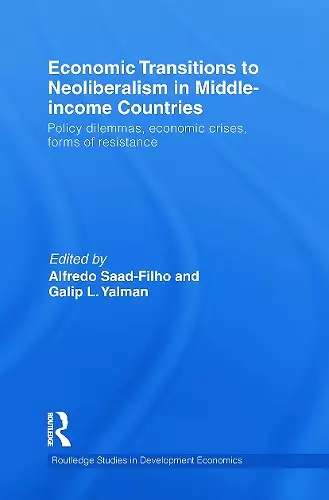Economic Transitions to Neoliberalism in Middle-Income Countries
Policy Dilemmas, Economic Crises, Forms of Resistance
Alfredo Saad-Filho editor Galip L Yalman editor
Format:Paperback
Publisher:Taylor & Francis Ltd
Published:11th Nov '13
Currently unavailable, and unfortunately no date known when it will be back
This paperback is available in another edition too:
- Hardback£100.00(9780415492539)

Neoliberalism is based on the systematic use of state power to impose, under the veil of ‘non-intervention’, a hegemonic project of recomposition of capitalist rule in most areas of social life. The tensions and displacements embedded within global neoliberalism are nowhere more evident than in the middle-income countries. At the domestic level, the neoliberal transitions have transformed significantly the material basis of social reproduction in these countries. These transformations include, but they are not limited to, shifts in economic and social policy. They also encompass the structure of property, the modality of insertion of the country into the international economy, and the domestic forms of exploitation and social domination. The political counterpart of these processes is the limitation of the domestic political sphere through the insulation of ‘markets’ and investors from social accountability and the imposition of a stronger imperative of labour control, allegedly in order to secure international competitiveness.
These economic and political shifts have reduced the scope for universal welfare provision and led to regressive distributive shifts and higher unemployment and job insecurity in most countries. They have also created an income-concentrating dynamics of accumulation that has proven immune to Keynesian and reformist interventions. This book examines these challenges and dilemmas analytically, and empirically in different national contexts.
This edited collection offers a theoretical critique of neoliberalism and a review of the contrasting experiences of eight middle-income countries (Brazil, China, India, Mexico, South Africa, South Korea, Turkey and Venezuela). The studies included are interdisciplinary, ranging across economics, sociology, anthropology, international relations, political science and related social sciences. The book focuses on a materialist understanding of the workings of neoliberalism as a modality of social and economic reproduction, and its everyday practices of dispossession and exploitation. It will therefore be of particular interest to scholars in industrial policy, neoliberalism and development strategy.
"While presenting a powerful analysis of the global structural transformations involved in the transition to neoliberalism, this volume avoids the trap of seeing this transformation as a primarily homogenising force. On the contrary global neoliberalism has reconstituted the economic and social institutions of capitalism differently in each country and region. It is precisely these differences that constitute one of the strengths of neoliberalism. This book is the definitive exploration of neoliberal transitions in a range of the most important middle income countries."
Terrence McDonough
Professor of Economics, National University of Ireland, Galway
ISBN: 9780415746229
Dimensions: unknown
Weight: 408g
272 pages